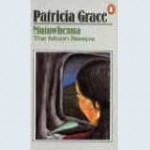Waitangi Day: Celebrating Us — In Literature
Today is Waitangi Day, New Zealand’s national holiday, when we commemorate signing of the Treaty of Waitangi between the Maori Chiefs of New Zealand and the British Crown.
Throughout my adult life, Waitangi Day has become the focus of protest about the wrongs from the many instances, throughout the past 174 years, in which the Treaty has not been honoured, to the detriment of the Maori people. As I acknowledged in my 2012 post, Waitangi Day: “He Iwi Kotahi Tatou”, these are very real issues and need to be addressed — but I also feel that we “…as a country…have a great deal to celebrate that is about being here together.”
I talk about some of those things in that post, including our literature. As a person who did a significant part of my growing up in a predominantly Maori community in the North Island’s King Country, I can’t shake the conviction that February 6 can still be about aroha (loving goodwill) and celebrating us.
I mentioned literature and I am a writer, so here are a few of the books that have celebrated us, for me:
 The Year Of The Shining Cuckoo by Joyce West
The Year Of The Shining Cuckoo by Joyce West
Predominantly about a boy and a horse, this children’s book is set in a rural area where the community comprises both Maori and Pakeha New Zealand. First published in 1961, West was aware that she was depicting a world that was already fast vanishing — but I continue to recognise the small community of my own childhood in elements of the story.
 Mutuwhenua, The Moon Sleeps by Patricia Grace
Mutuwhenua, The Moon Sleeps by Patricia Grace
Patricia Grace is one of New Zealand’s foremost novelists and in 2012 I mentioned her novel Tu, which won the Deutz Medal for Fiction or Poetry at the (then) Montana New Zealand Book Awards 2005. (An earlier novel, Potiki, had also won the fiction section of the New Zealand Book Awards in 1987.) I think, though, that Mutuwhenua will always be my personal favourite, not just because it’s the first book by Grace that I read, but also because it was one of the first adult NZ novels I read that really spoke to my personal experience of New Zealand.
Whanau is another novel that I identify as being amongst the first to really speak to my experience of New Zealand. I was studying in Sweden at the time, a very long way from home, and I will always remember reading the opening description of the community and approaching it through getting on the local bus — and thinking: “Yes, yes: this is how it is.” That feeling of recognition and “yes” stayed with me throughout the novel, which is possibly why, although I know there has been a new updated version published subsequently, I will never replace the version I first read.
So far, I have focused on novels that ‘speak to us’ in terms of the overlap between Maori and Pakeha (NZ-ers of European origin) cultures. But if Waitangi Day and the Treaty are about nationhood, then ‘celebrating us’ also encompasses stories from within one culture, or which transcend it. (I would argue that Whanau comes close to being told from within one culture, too.) Books that have done that for me include:
The shock of recognition and delight in his book was the account of a small town, Pakeha New Zealand childhood that bridged the generation between my own experience and the stories my mother told me. It is not quite my own experience, but I recognise a great deal of what it contains nonetheless — and hear the echo of my mother’s story in that of the mother in the book.
Three cultures overlap in this book: Maori, Pakeha and Chinese — but what I admired most about the story is the way it transcends cultural divides to create something that is distinctively and authentically Kiwi. I also really like that although I have heard the story described as ‘magic realism’ I couldn’t really tell you what kind of tale it is — just that I loved reading it.
Anyway, this is just a handful of the books that I could have mentioned — but I thought I’d better save a few for next year. 😉
Tena koutou katoa: enjoy your Waitangi Day everyone.










